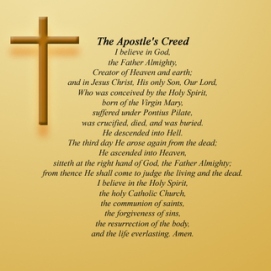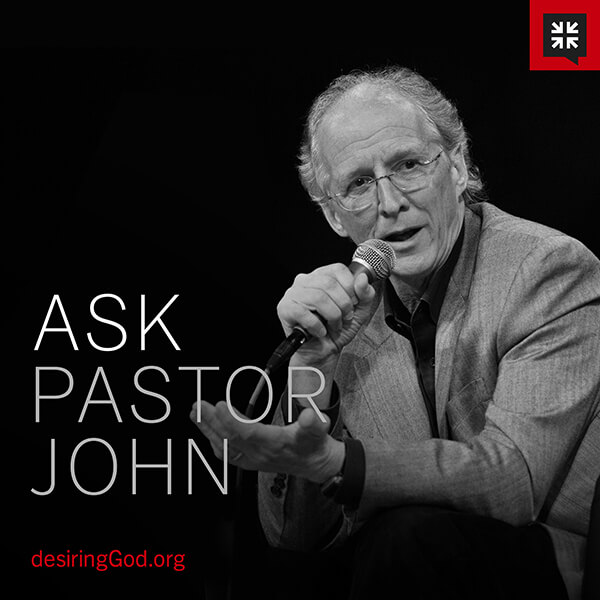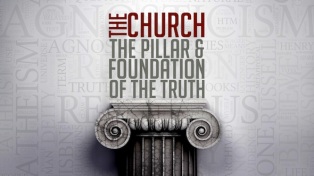I became a Christian in a church that didn’t make use of ancient creeds, and then I didn’t recite a creed in worship for the first 25 years of my faith. I was led to understand that the Bible, not creeds, is what we should know and recite (though we didn’t really do either). The old creeds, I was told, are like everything else from the historical tradition of Christianity: extra-Biblical formalism that breeds hypocrisy, mindlessness and boring worship programming.
 (Meanwhile, I was encouraged to write acrostic missions statements, paste them on banners, etch them into glass windows, and have my congregations commit them to memory. This wasn’t extra-Biblical, hypocritical or mindless … this was cutting edge church leadership! But I digress…)
(Meanwhile, I was encouraged to write acrostic missions statements, paste them on banners, etch them into glass windows, and have my congregations commit them to memory. This wasn’t extra-Biblical, hypocritical or mindless … this was cutting edge church leadership! But I digress…)
I have “graduated” to a wholehearted embrace of creedal Christianity. Specifically, my adopted faith tradition embraces three ancient creeds: The Apostles’ Creed (c. 180 AD), the Nicene Creed (325 AD), and the Athanasian Creed (c. 440 AD). Today, a few words about the Apostles’ Creed, which is truly an “ancient path” that has been traveled by millions of believers over two millennia.
I think of the Apostles’ Creed as the swiss-army-knife of the church: A concise creed with multiple uses!
- Personal Faith: Like it did from its organic inception during the first two centuries AD, it provides a means by which we determine who is and isn’t a Christian. It’s a great litmus test for every individual to see if her beliefs line up with classical Christianity.
- Teaching: It also provides an ideal outline for discipleship. Martin Luther, in his Small Catechism, says of the Creed, “As the head of the family should teach it in a simple way to his household.” Both at church and in the home, it functions as our syllabus for ongoing instruction.
- Evangelism: It is a great tool for proclaiming the gospel. It answers the question, “what must I believe to be saved?” Christians who have the points of the Apostles’ Creed memorized have at their disposal all of the necessary talking points for sharing the central tenets of the our faith.
- Worship: The Creed provides for a beautiful act of worship when read corporately. As the Psalmist says, “One generation will declare your works to the next and will proclaim your mighty acts” (Ps. 145:4). When we together in an intergenerational gathering of worship proclaim the Apostles’ Creed – creation, incarnation, sacrifice, forgiveness, resurrection, ascension, judgment and heaven – our faith is refined, we transmit our beliefs to everyone in the service (believers or not), and are encouraged by the shared testimony of others.
- Contextualization: The Creed is brilliant for use in places where the church isn’t so literate. We can take for granted in our well-educated Western society that truth is “most true” when it’s in writing. But many through history, including many today, must understand their faith in manageable, memorable ways.
Again, I grew up without the Apostles’ Creed. So, my litmus test for belief changed with each new church community I attended (most of which felt compelled to write their own doctrinal statements). My discipleship and evangelism training regularly shifted to whatever the latest popular Christian book had to say. Most of my fellow believers in churches have felt hopelessly ill-equipped to evangelize their family and neighbors, much less their friends, and keep trying to come up with an effective resource and training program for outreach. And, because of a wholesale rejection of classical, formal worship elements (including creeds), my faith was enslaved to the always-shifting spontaneous utterings of my pastors.
Life is better with creeds. A bit on the content of the Apostles’ Creed tomorrow.
– EO
(Some good historical information about the Ecumenical Creeds can be found here.)



 In the U.S.A., most in our congregations are citizens (though there are also immigrants, aliens and sojourners among us). Most of these are proud of their country. In many churches, the expression of that national pride has become a part of Sunday worship celebrations, and even special programming centered around our pride in, love for, and allegiance to the U.S.A.
In the U.S.A., most in our congregations are citizens (though there are also immigrants, aliens and sojourners among us). Most of these are proud of their country. In many churches, the expression of that national pride has become a part of Sunday worship celebrations, and even special programming centered around our pride in, love for, and allegiance to the U.S.A. Recently, John Piper shared his thoughts about
Recently, John Piper shared his thoughts about  But this approach and this rhetoric fails to give weight to the Biblical truth that the Kingdoms of this world are a divinely ordained extension of the rule and reign of God. “
But this approach and this rhetoric fails to give weight to the Biblical truth that the Kingdoms of this world are a divinely ordained extension of the rule and reign of God. “ So, if I might take the liberty of reshaping Piper’s previous paragraph: “We swear absolute allegiance to him, and our allegiance to our country is an extension of our acknowledgement of His rule. All other commitments are contained in this over-arching commitment to God … All of those authorities, though subordinate, needn’t be considered “secondary” to the authority of Christ, but part of it. Therefore, all submission needn’t be qualified, except in instances when disobedience to Christ is mandated.”
So, if I might take the liberty of reshaping Piper’s previous paragraph: “We swear absolute allegiance to him, and our allegiance to our country is an extension of our acknowledgement of His rule. All other commitments are contained in this over-arching commitment to God … All of those authorities, though subordinate, needn’t be considered “secondary” to the authority of Christ, but part of it. Therefore, all submission needn’t be qualified, except in instances when disobedience to Christ is mandated.” “Watch out for false prophets. They come to you in sheep’s clothing, but inwardly they are ferocious wolves”
“Watch out for false prophets. They come to you in sheep’s clothing, but inwardly they are ferocious wolves” “
“ Our cities, littered with denominational church institutions of numerous stripes, stands as a testimony to this reality in our day. Clearly, all “truths” are not created equal. In a culture where truth is relative, and everyone’s truth “ought to be honored”, it may be politically incorrect to insist on doctrinal purity … but it is no less important, and perhaps never more urgent. Churches need to be more effective at being the “pillar and foundation of the truth” in our world (1 Tim. 3:15). But individual believers also need to be relentlessly thorough in their knowledge about God.
Our cities, littered with denominational church institutions of numerous stripes, stands as a testimony to this reality in our day. Clearly, all “truths” are not created equal. In a culture where truth is relative, and everyone’s truth “ought to be honored”, it may be politically incorrect to insist on doctrinal purity … but it is no less important, and perhaps never more urgent. Churches need to be more effective at being the “pillar and foundation of the truth” in our world (1 Tim. 3:15). But individual believers also need to be relentlessly thorough in their knowledge about God.  One of primary reasons people don’t like Christians is because they think us to be hypocrites. We regularly fail to live up to the high standards to which we aspire, and about which we preach. We compound the world’s frustration when we lobby to see those standards embraced by everyone (e.g., championing “family values”, even political legislation) when we do such a poor job of living them out ourselves.
One of primary reasons people don’t like Christians is because they think us to be hypocrites. We regularly fail to live up to the high standards to which we aspire, and about which we preach. We compound the world’s frustration when we lobby to see those standards embraced by everyone (e.g., championing “family values”, even political legislation) when we do such a poor job of living them out ourselves. Biblical writers,is totally different.
Biblical writers,is totally different. giftings all our brothers and sisters around us.
giftings all our brothers and sisters around us. My encouragement is for all to look beyond those poor representations of an incredible faith. See instead the real deal, the substance of genuine, classical Christian living. I am sure that, if our churches were full of these humble, prayerful, fruitful people, that Christianity would have a much better name in our world. You might even be interested in joining their ranks.
My encouragement is for all to look beyond those poor representations of an incredible faith. See instead the real deal, the substance of genuine, classical Christian living. I am sure that, if our churches were full of these humble, prayerful, fruitful people, that Christianity would have a much better name in our world. You might even be interested in joining their ranks. Frederick Beuchner is one of my favorite authors. His insights into the spiritual life, with Christ at its center, have been very formative to me. I recently signed up for
Frederick Beuchner is one of my favorite authors. His insights into the spiritual life, with Christ at its center, have been very formative to me. I recently signed up for  I’ve been a minister for decades. Sometimes I fall into the trap of believing that I’m some kind of divinely appointed DA for the Lord, guiding testimonies in the court of public opinion. If I do my job right, I’ll be able to lead the “jury” to my appointed conclusions. That’s why I’ve been lured into my share of (what I have found to be counter-productive) social media rants, thinking that my clear delineation of spiritual realities through Spirit-taught (Biblical) words will win the day.
I’ve been a minister for decades. Sometimes I fall into the trap of believing that I’m some kind of divinely appointed DA for the Lord, guiding testimonies in the court of public opinion. If I do my job right, I’ll be able to lead the “jury” to my appointed conclusions. That’s why I’ve been lured into my share of (what I have found to be counter-productive) social media rants, thinking that my clear delineation of spiritual realities through Spirit-taught (Biblical) words will win the day. s stream down like a torrent day and night! Give yourself no rest, your eyes no respite! Arise, cry out in the night, at the beginning of the watches! Pour out your heart like water before the presence of the Lord! Lift your hands to him for the lives of your children.” When facing times of inordinate calamity, the call of God to His people is to pray. But this is so much more than saying a quick prayer before the evening meal, or listing “world peace” as you go down your prayer list. Jeremiah describes a brand of prayer that rends ones mind, heart and body to the Lord. Hands lifted, hearts poured out, from the rising of the sun to the late hours of the night. “Give yourself no rest, your eyes no respite.”
s stream down like a torrent day and night! Give yourself no rest, your eyes no respite! Arise, cry out in the night, at the beginning of the watches! Pour out your heart like water before the presence of the Lord! Lift your hands to him for the lives of your children.” When facing times of inordinate calamity, the call of God to His people is to pray. But this is so much more than saying a quick prayer before the evening meal, or listing “world peace” as you go down your prayer list. Jeremiah describes a brand of prayer that rends ones mind, heart and body to the Lord. Hands lifted, hearts poured out, from the rising of the sun to the late hours of the night. “Give yourself no rest, your eyes no respite.” ‘s just doing his job – hear from God, and tell the people. All he wants to do it help. And he’s right.
‘s just doing his job – hear from God, and tell the people. All he wants to do it help. And he’s right. servant is not greater than his master.’ If they persecuted me, they will also persecute you. If they kept my word, they will also keep yours” (John 15:20).
servant is not greater than his master.’ If they persecuted me, they will also persecute you. If they kept my word, they will also keep yours” (John 15:20).
Any Chance We Might Grow Up?
Withholding love from another person is the supreme act of childishness. Forbearing, proactive love … that’s the trait of a mature adult. We need God for that.
———————
This from one of Christianity’s most popular texts, 1 Corinthians 13: “When I was a child, I spoke like a child, I thought like a child, I reasoned like a child. When I became a man, I gave up childish ways” (13:11). What are these childish ways that Paul is talking about? In the context of this chapter, it’s quite simple. It is childish to withhold love.
“And if I have prophetic powers, and understand all mysteries and all knowledge, and if I have all faith, so as to remove mountains, but have not love, I am nothing.” If I, in my self-perceived brilliance, believe in my convictions can change the world around me, but cannot be kind when I present them, I am nothing.
“If I give away all I have, and if I deliver up my body to be burned, but have not love, I gain nothing.” Even if I “walk my talk”, and am involved in all kinds of service projects that support my causes, but my heart and attitude toward others who disagree with me remains angry and contentious, the gain of my good works is nullified.
So, what is this love that Paul speaks of? It is, primarily, staying active in hard relationships. “Love is patient and kind; love does not envy or boast; it is not arrogant or rude. It does not insist on its own way; it is not irritable or resentful; it does not rejoice at wrongdoing, but rejoices with the truth. Love bears all things, believes all things, hopes all things, endures all things. Love never ends.”
Kind. Love suffocates in non-relationship. It breathes through activity. Being kind is love. Just choosing to be neutral — to not be unkind — isn’t love.
Patient. Bearing. Enduring. Never-ending. Love assumes things will get difficult, and stays in the game anyway. To bail out on a relationship when it doesn’t go your way, that’s childish.
Arrogant. Rude. Irritable. Resentful. If these words describe you, then you’re acting like a child.
If you are so bent toward someone that you actually rejoice when things don’t go their way … this is the height of immaturity.
Children think they know. Then they become judge and jury over you. You will be found guilty. Love is gone. Existence becomes null and void.
God, through His Word, calls us to put away these childish behaviors. He provides the means to do so. But these days few are listening to God, and even fewer are availing themselves to the divine empowerment that makes change possible. Even those who find God interesting remain unwilling to hear His call to us to exercise the self-sacrificing kind of love that could change the world.
Any chance we might grow up? Our chance is contingent on our love for God … which will enable our love for our neighbor. Without God? No chance.
“If anyone would come after me, let him deny himself and take up his cross and follow me. For whoever would save his life will lose it, but whoever loses his life for my sake will find it” (Matthew 16:24-25).
– EO
Posted by EO - on September 8, 2017 in 21st Century, Christianity, church, Contemporary Experiences, Culture, Discipleship, Hope, Politics
Tags: 1 corinthians, adults, apostle paul, child, childish, children, commentary, immature, love